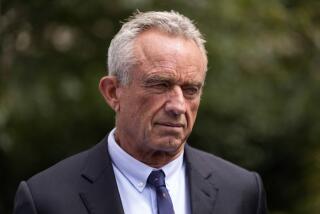Kerrey Decides Not to Pursue Presidential Bid
- Share via
OMAHA — Sen. Bob Kerrey (D-Neb.) chose the course of prudence Sunday and announced he will run for reelection in 2000, rather than challenge Vice President Al Gore for the Democratic presidential nomination.
The decision, disclosed at a news conference here after a weekend of closed-door discussions with supporters from Nebraska and around the nation, disappointed but did not surprise many of the hundreds who met with Kerrey.
It removes one potentially serious challenger from Gore’s path to the nomination, but Sen. Paul Wellstone of Minnesota and former Sen. Bill Bradley of New Jersey have taken preliminary steps toward running, and Sen. John F. Kerry of Massachusetts and House Minority Leader Richard A. Gephardt of Missouri are still weighing the possibility.
But Kerrey, who has challenged Clinton administration policy on several key domestic and international issues, was viewed as someone who could raise the funds for a national campaign and perhaps pose a test for Gore in the leadoff caucuses in Iowa.
Kerrey said the formidable support Gore enjoys as the administration candidate for the nomination was “a factor” in his decision “but not the dominant reason.”
However, during a private session, according to participants, Kerrey talked about the influence First Lady Hillary Rodham Clinton could have with loyal Democrats if, as expected, she campaigns for Gore in the primaries of 2000.
The task of raising the millions of dollars needed to compete for the nomination was formidable but not insurmountable, those who met with Kerrey said. Ben Barnes, the former Texas lieutenant governor, said he challenged the leaders of BACK-PAC, Kerrey’s personal political action committee, to consider how much each of them would commit to raise for the $30 million to $35 million that Barnes said Kerrey would need between now and the Democratic convention in 2000.
Many of those out-of-state operatives and fund-raisers said they gave Kerrey encouraging words about his campaign prospects in their states.
The 55-year-old senator, who completes his second term in two years, said he had decided he could provide more leadership on state concerns and national issues by remaining where he is. Close colleagues in the Senate, who had predicted his decision, said they thought he preferred to spend the next year influencing decisions on Social Security and Medicare rather than organizing a presidential campaign.
Some also said Kerrey is not certain 2000 will be a good year for Democrats and preferred to focus any national ambitions on 2004, a year when he will not be up for reelection.
Kerrey said Sunday that Nebraska law might have allowed him to run for the presidential nomination and seek reelection simultaneously in 2000, but he thought that would be “immoral.”
Kerrey orchestrated the announcement in his typically unconventional way. He assembled friends and supporters from Nebraska and elsewhere for a weekend of talk, even though he told reporters he had made up his mind weeks ago.
The centerpiece of the weekend was a half-day Saturday seminar on foreign trade issues, for which he recruited speakers including Omaha investment tycoon Warren Buffett, former Secretary of Labor Robert B. Reich, former White House budget director Franklin D. Raines and a dozen prominent academics.
Kerrey ran for the Democratic presidential nomination in 1992 but finished third in the New Hampshire primary, behind the late Paul E. Tsongas and Bill Clinton, with 11% of the vote. A week later, he won his only victory in South Dakota, but a week after that, he slumped to fourth place in Colorado, ran poorly in Georgia and Maryland, and, out of money, dropped out of the race.
More to Read
Get the L.A. Times Politics newsletter
Deeply reported insights into legislation, politics and policy from Sacramento, Washington and beyond. In your inbox twice per week.
You may occasionally receive promotional content from the Los Angeles Times.










